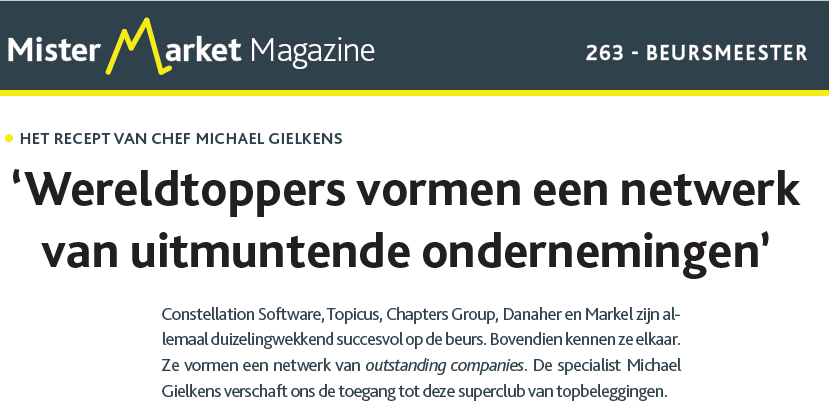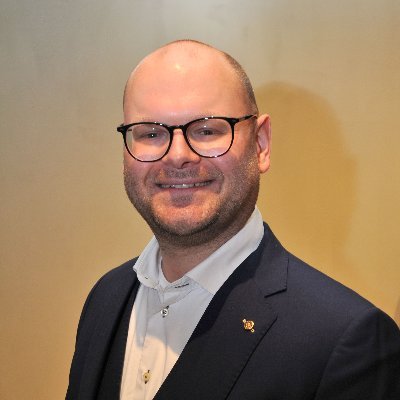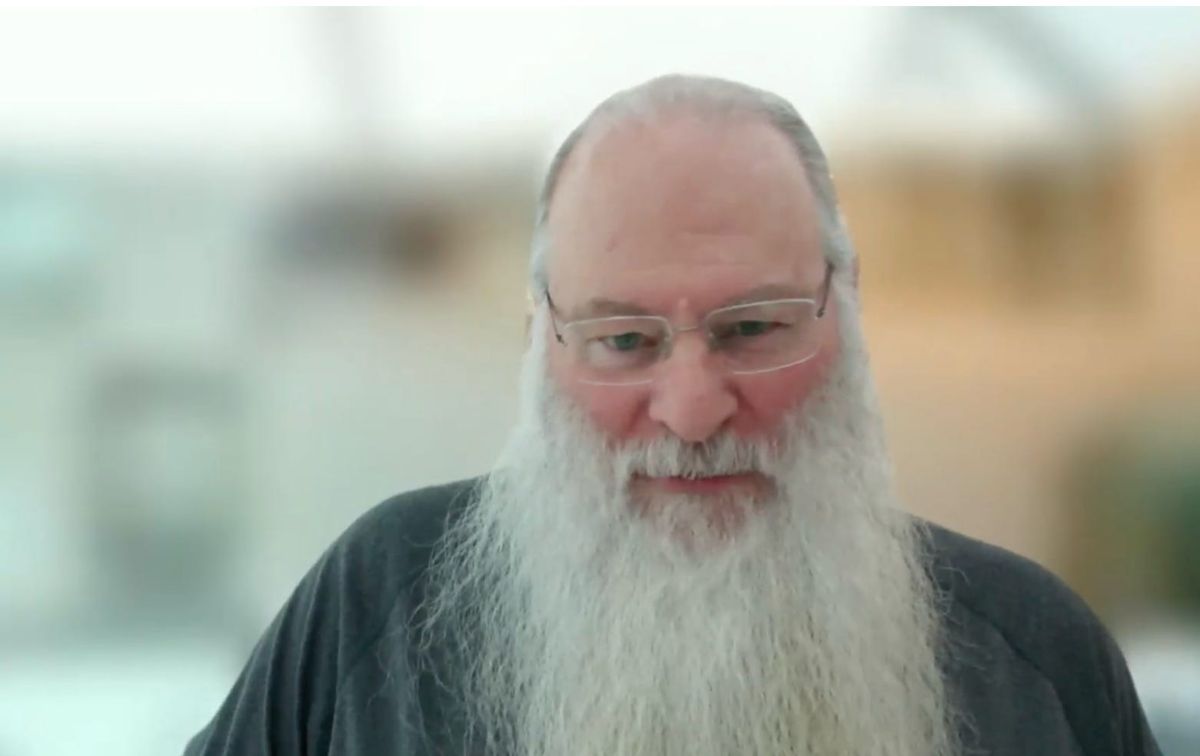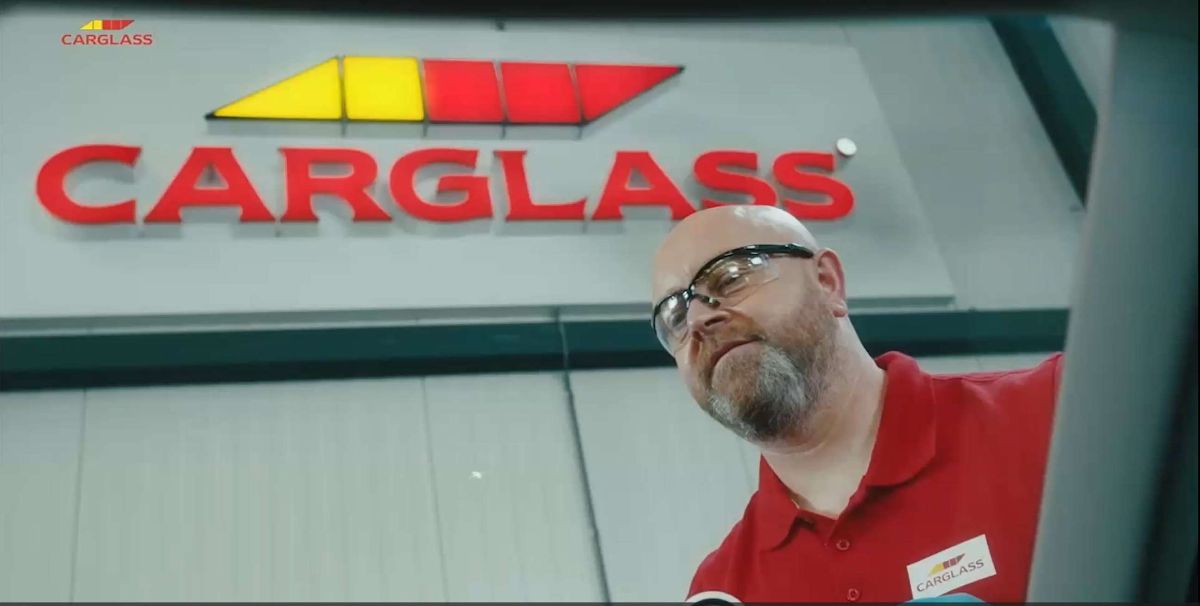An interview with holding specialist Michael Gielkens, partner at Tresor Capital, recently appeared in issue 263 of Mister Market Magazine. We are happy to share this interview with you here.
Mister Market Magazine positions itself as a magazine to support the (private) investor in selecting profitable investments and developing a sound strategy. The site features the telling slogan: “Give man a fish, and he has food for a day. Teach man to fish, and he has food for all his life. Mister Market Magazine teaches you how to fish in the stock market.”

Pierre Huylenbroeck: “Michael Gielkens is a fan of family-controlled holdings. The Dutchman makes it his trademark, so his name is beginning to quietly echo in Flanders as well. Gielkens is a partner at Tresor Capital, an independent brokerage house in Maastricht. He manages to distinguish Tresor by going full-on for companies in which the owners have “skin in the game. Their capital is in the company, so they are in the same boat as retail investors. I spoke to him at the recent VFB Happening in Ghent, where the enthusiastic talker also gave a well-attended speech. It was about holdings, of course.”
“Where did you find your love of holdings?”
Michael Gielkens: “In 2009, when I was 20, I joined an investment club: Ominor. That’s Latin for “I bet. Nice name, I thought, but it turned out to be a completely wrong choice: there’s a lot you can do in the stock market, but predicting is definitely not one of them. Ominor had Berkshire Hathaway in its portfolio. That appealed to me. It was the very first stock I bought for myself as well, along with my father.’
‘You started with the very best holding in the world, from the very best investor Warren Buffett. A lucky start!’
Gielkens: “I didn’t know the man at all then. But that would soon change. I read everything I could about and from that fascinating senior citizen, from his annual reports to the many biographies. The more I read, the greater my adoration. It helped, of course, that we could buy the stock for less than $80 and that it now costs $527.’
“What was the most important lesson for you after all that Buffett reading?”
Gielkens: “That you have to be with Buffett with your savings. Or with others who invest the Buffett way. Usually these are also family holding companies. I quickly realized that these types of companies are a much better investment than any bank mutual fund. I knew then: holding companies where the founder or at least one of their descendants is in it with his fortune and calling the shots, that’s going to be my thing.

Tresor Capital partner Michael Gielkens
“What book on Buffett do you recommend?”
Gielkens: ”The Essays of Warren Buffett” by Lawrence Cunningham. Cunningham also wrote “Quality Investing,” one of the best books on quality businesses. He is also on the board of directors of three of the world’s most highly regarded companies: the American Markel and the Australian Kelly Partners Group.
And perhaps the best of them all, next to Berkshire Hathaway: Constellation Software, the serial acquirer in the software sector of longtime legendary but still only 68-year-old founder Mark Leonard. Cunningham is even vice chairman there. The real top performers seek each other out. Thus is created a network of outstanding companies.’
“When did you also start focusing on those outstanding companies in a professional way?”
Gielkens: “Since the end of 2016, I have been the driving force behind a holding portfolio for the Dutch investment boutique Tresor Capital, since 2021 as a partner and co-owner of Tresor.
“What return is your fund achieving?”
Gielkens: “Since the beginning of 2017, our ‘family holding companies’ portfolio has been achieving an annual average return after expenses of 10.9 percent, despite our large exposure to Europe.
“From what investment did you derive your greatest satisfaction?”
Gielkens: “We bought Constellation in 2020 for 1,600 Canadian dollars. Against the advice of the then owner. According to my discounted cash flow calculations (DCF), it was worth at least $2,600. DCF is the method of estimating the present value of all future profits. My boss at the time said, “Don’t try to value future growth, Michael. That’s pie in the sky. Calculate fair value using the Sum of the Parts method (SotP): estimate the value of all interests and add them up.’
“You disagreed with your boss?”
Gielkens: “Not for Constellation Software. For ordinary holding companies, SotP can work just fine. For serial acquirers, DCF is better, because most of those acquired companies often gain value after a while, just because they were acquired by a large outstandingly managed holding company. SotP would be a huge underestimation of the potential of the Constellation types.
But because valuation is largely the result of personal expectations anyway, we always work with five scenarios, from extremely pessimistic to euphoric. The base scenario and the two gloomy estimates together weigh in at 75%, the most euphoric at only 7.5%. Only if that cautiously estimated valuation is still sufficiently above the current share price do we consider a purchase.’

Mark Leonard, founder and inspirer of Constellation Software.
‘Sufficiently above the current course? Can you be more specific?’
Gielkens: ‘Our purchased shares must be able to realize an average return of at least 10% for at least the next five years. If we no longer believe in this, a sale is imminent.’
“Did that happen recently?”
Gielkens: “Yep. We sold our stake in the Italian holding company Exor at EUR 91. Exor became big thanks to well-known automotive boss Sergio Marchionne, who turned the Fiat group into a world leader. He passed away in 2018. His successor John Elkann is not doing badly, but I see Exor opting more and more for deep value , for lagging value, like Philips. That can work, but I believe more in justifiably expensive quality. It also doesn’t help these weeks that Exor, with Stellantis, is heavily invested in a car manufacturer for which the U.S. is an important market.’
“Did you buy anything in Exor’s place?”
Gielkens: “Brown & Brown, an American insurance broker. A serial acquirer of the purest kind. A real machine on value creation. Hyatt Brown, the chairman of the board who still owns over 10% of the shares, turns 88 this year. Recently he said: ‘I’m going to slow down. I’m still working a maximum of 45 hours a week.’ THAT is the spirit!
“Are they too part of that cue of outstanding companies?”
Gielkens: “Definitely! Brown & Brown is of the ‘Friendly Middlemen’ quality type , adding value by facilitating transactions, managing risk or improving efficiency, without producing or owning the end products themselves. This is a highly scalable, predictable and low capital-intensive business model that is not very sensitive to economic fluctuations.’
‘Topicus is also part of that network. That share is also in our Wally portfolio.’
Gielkens: “Topicus is a spin-off of Constellation. It is legally a Canadian company, but from the Netherlands, Topicus is doing what Constellation does in America: acquiring software companies that immediately contribute to profits. I have a big bean for Topicus. The stock looks expensive, but if I had to choose today which stock I would most like to buy, it would be Topicus.’
‘Waldorf will love reading it. Why Topicus?
Gielkens: “Actually, both Topicus and Constellation are my two top favorites. Nevertheless, I see three advantages for Topicus. First, the European market in the software industry is more fragmented than the U.S. market. So a consolidator has more opportunities here. Second, valuations in Europe are lower than in the US. Third, bureaucracy is a lot higher here. For a market leader like Topicus, this is an advantage: customers won’t easily go to the competition, because it requires a lot of paperwork.
Moreover, Topicus is cleverly capitalizing on the fragmentation of all those European rules and laws by owning a local champion everywhere. Also in Belgium: early this year, Topicus took over Cipal Schaubroeck for 150 million euros. In Poland, it bought 25% of a local listed serial acquirer Asseco for 420 million. That’s how fast it goes, of course.’
‘At the VFB event, you spoke about another family holding company, Germany’s Chapters Group.
Gielkens: ‘An extremely fascinating company. A mini-Constellation Software, in fact. Moreover, also known to American classics. Marc Maurer, the chief operating officer of Chapters, worked for years at Constellation. And Mitch Rales, the founder of Danaher, also an outstanding serial acquirer, took a 14.4% stake in Chapters a few years ago. Rales likes to invest in companies that excel in vertical market software.’
“Vertical market software?”
Gielkens: “Software developed specifically for one particular sector, such as the specific industries in the public sector at Topicus. Chapters also focuses on building platforms for well-defined sectors. A serial acquirer can make the difference in vertical market software because integration can lead to enormous economies of scale. What also attracts me to Chapters is that it places great importance on the “skin in the game” aspect. Of the acquired companies, the founder keeps 20% of the shares, which he may later convert into Chapters shares. That gives a lot of gusto to make something of it. By the way, now another thing comes to mind. Does the name William Thorndike mean anything to you?
‘Of course! That man wrote one of my economic favorite books “The Outsiders. We discussed it in n°13. What about it?
Gielkens: “He owns 5.2% of Chapters. Just to say: the real experts believe in it. And so do we.’
“Is Chapters now buyable?”
Gielkens: “Cheap it doesn’t look cheap, but there is still stretch to it. In vertical market software, many Chapters-acquired companies were too squeamish in their pricing. Especially Maurer, with all his experience at Constellation, repeatedly said: ‘The customer will surely not walk away after a price increase, because your offer is unique.’ Profit margins are systematically increasing. Thus, Chapters can sustain double-digit growth for years to come. In my opinion, this share can still grow tenfold.’
“Do you also own Belgian holdings?”
Gielkens: “We have Brederode and Sofina. For Sofina, we ask for a 10% discount. It used to be more than 20%, but then Sofina was mainly in companies like Colruyt and Danone, very solid but with limited growth prospects. But look what Sofina now invests in: Team.blue, Nuxe, Cognita, Bio- First, TikTok and Twin Health.’
We have to conclude. Do you have any final comments?
Gielkens: ‘That we own another Belgian. Recently we stepped into D’Ieteren. When the group took on debt last year to pay a special dividend of 74 euros per share, we were not happy with the terms: the capital of the holding company was used by one member of the family to buy out the other. D’Ieteren showed no respect for the small co-shareholders, as they had to pay a 30% tax on that dividend. In the meantime, I have revised my opinion, because I think another aspect is more important: the disagreement between the family shareholders is now gone. With Nicolas D’Ieteren, there is now only one captain on board.’

“Is that why you bought the stock?”
Gielkens: “I thought it was a bargain, with an all too hidden gem. Belron (pictured), the auto glass repair company known in Belgium as Carglass, has fallen head over heels, because windshield repair has become a complex business with high profit margins, courtesy of all the sensors that are in windows these days.’
‘Meanwhile, the stock costs 170 euros. Would you still buy it at that price?’
Gielkens: ‘Yes, we have recently revised our estimate upwards as a positive consequence of the operational developments at Belron and the other portfolio companies. As a result, we now see a discount of 35 to 40 percent, which is already too much. CEO Francis Deprez is incredibly solid and has a compelling long-term vision. I think the appointment of Carlos Brito, the man behind AB InBev, as CEO of Belron is positive. Brito knows how to lead a global leader. Within this and three years, Belron will go public, for sure. And Moleskine? We’ll forgive D’Ieteren for that, won’t we? By the way, that was a purchase from a previous management.’
“Finally, which holding company would you definitely not invest in today?
Gielkens: “Peugeot Invest. Some real estate deals have gone firmly awry and the exposure to the cyclical auto sector is significant. What bothers me most is how the Peugeot family serves itself. When they changed their name from FFP to Peugeot Invest, they negotiated a license fee to use their own name. That doesn’t exactly feel like a gesture toward fellow shareholders. I look for companies where the interests of insiders and those of outside shareholders are neatly aligned. Here it is out of step. So we are not stepping in.’